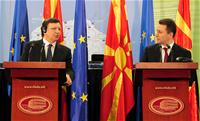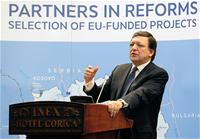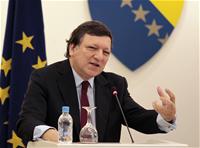Barroso urges more reforms from Macedonia and Bosnia
Evelyna Topalova, April 14, 2011
 The visit of European Commission (EC) President Jose Manuel Barroso to Macedonia and Bosnia and Herzegovina (BiH) last weekend (9-10 April) did not bring any unexpected news. He urged for speeding up of reforms, strengthening of political dialogue and national consensus over issues related to EU integration.
The visit of European Commission (EC) President Jose Manuel Barroso to Macedonia and Bosnia and Herzegovina (BiH) last weekend (9-10 April) did not bring any unexpected news. He urged for speeding up of reforms, strengthening of political dialogue and national consensus over issues related to EU integration.
His main message to Macedonian leaders was to find a solution to the name dispute with Greece as soon as possible. Local media noticed that Barroso failed to use the constitutional name of the country Republic of Macedonia and avoided diplomatically questions related to the topic. The name row, which poisons the relations between Skopje and Athens and which is the main obstacle to the European and Euro-Atlantic integration of the country, obviously will not be resolved in the coming months.
Ruling parties and opposition are getting ready for snap elections that are expected to be held on June 5th. Commenting on the upcoming vote, Barroso stressed the need of conducting transparent, democratic and fair elections which to be in line  with international standards. Barroso urged also for accelerating the pace of reforms, improvement of political dialogue, judiciary reform, boosting the fight against corruption and guaranteeing the freedom of expression.
with international standards. Barroso urged also for accelerating the pace of reforms, improvement of political dialogue, judiciary reform, boosting the fight against corruption and guaranteeing the freedom of expression.
Macedonian Prime Minister Nikola Gruevski, who will most probably remain in power after the elections, reassured Barroso and accompanying EU Enlargement Commissioner Stefan Fuele that the authorities would continue with reforms.
He voiced once again willingness to find a solution to the name dispute. "The goal is to find a sustainable solution that will be acceptable for both sides, a solution that will be based on respect of the basic principles and values of the EU and that will not be to the detriment of the national, linguistic and cultural identity of the Macedonian people," Gruevski said.
A mutually acceptable solution will be hard to achieve if the two sides keep on maintaining their firm positions and refuse to make concessions. The Hague-based International Court of Justice is expected to deliver by the end of the year its opinion on Macedonia's complaint against Greece for blocking its membership in NATO. The ruling, however, will hardly contribute to resolving the row.
In order to give further impetus to Macedonia's EU integration process, Barroso proposed launching of the so-called accession dialogue at top level. This means that Macedonian and EU officials will meet twice a year to discuss in details the reform process and reforms implementation.
 The accent during the visit of the EU officials to Bosnia was put on the necessity of a political dialogue and compromises in order to establish state level authorities as soon as possible. The EC President highlighted that in its path towards EU membership the country needed functional institutions that will speak in one voice to Brussels.
The accent during the visit of the EU officials to Bosnia was put on the necessity of a political dialogue and compromises in order to establish state level authorities as soon as possible. The EC President highlighted that in its path towards EU membership the country needed functional institutions that will speak in one voice to Brussels.
He outlined the main tasks ahead of Sarajevo - to amend the constitution, removing clauses that discriminate against minorities, thus complying with the ruling of the European Court on Human Rights scrapping clauses, to pass a state aid law and state level population census law.
Barroso announced that the EU would appoint soon a head of its delegation in Bosnia who would be in the same time an EU special representative to the country. In conclusion the EC President stressed that 2011 would be a very important year for the European perspective of the Western Balkans and now it is up to the region to prove it really wants the EU membership.
 Bakir Izetbegovic, Andrej Plenkovic | © Council of the EU
Bakir Izetbegovic, Andrej Plenkovic | © Council of the EU Aleksandar Vucic, Recep Tayyip Erdogan | © Serbian Presidency
Aleksandar Vucic, Recep Tayyip Erdogan | © Serbian Presidency Jean-Claude Juncker, Zoran Zaev | © European Commission
Jean-Claude Juncker, Zoran Zaev | © European Commission